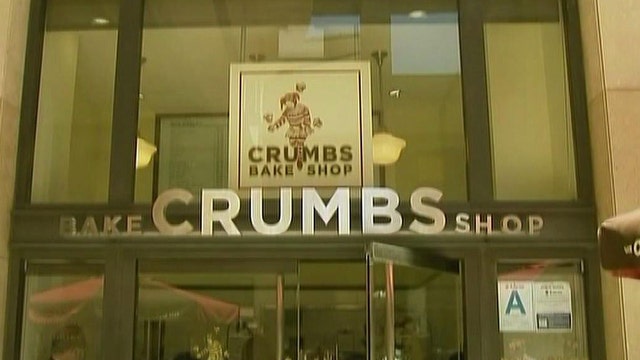Cupcake Shops Say Business Isn’t Crumbling
Is the cupcake business crumbling to pieces?
According to a Wall Street Journal report, that’s the case for the national bakery chain Crumbs.
The company’s stock is down nearly $12 from mid-2011 – and its future doesn’t look so sweet, either. Earlier this month, the company said sales for the full year would likely be 22% lower than earlier projections.
According to the WSJ report, the cupcake trend was born when demand for gourmet cupcakes exploded in the early 2000s, thanks to Magnolia Bakery’s appearance on the HBO show Sex and the City. But is the craze really beginning to go stale? Some U.S. bakers beg to differ.
“We’ve been doing this for six years, and we’ve grown every single year. We’re about to announce plans for our fourth location,” says Sarah Forrer, owner of Ohio’s Main Street Cupcakes. Forrer says Main Street was the first cupcake-only shop to open up in Ohio.
And one state over in Pennsylvania, Cupcakes Gourmet owner Maki Evans agrees: she’s opened up three stores since she launched in 2008 and has seen a 10% growth in business year over year.
Location might have something to do with Crumbs’ fall, says Dreamcakes owner Jan Moon. She says the cupcake trend is still going strong in Birmingham, Alabama, but adds, “we live in the South, so word travels kind of slow down here.” Moon plans to expand to two more locations within the year.
Bakeries Aim to Stand Out from the Pack As cupcake shops have popped up around the country in increasing numbers, many owners say it’s increasingly important to differentiate their stores from competitors.
In Ohio, Forrer says while the cupcake market has become saturated, she’s “cautiously optimistic” that there’s room enough for everyone.
In order to stay on top, though, Forrer says she’s recently joined the National Specialty Food Association, and she tries to stay one step ahead of “foodie” trends, debuting more salted and savory flavors recently.
In Arizona, Sweet Daddy Cupcakes owner Jason Podany refers to his three-store chain as “the exact opposite of Hooters”: Podany, a bodybuilder himself, hires a mostly male staff of college and high school athletes to sell cupcakes wearing tight black t-shirts.
1960s GMC with a hot rod kind of flair,” says Podany.
Many cupcake shops are also trying to diversify their offerings, in addition to their bakery branding. In Austin, Texas, Toot Sweet owner Tiffany Bacon says she’s started selling a boxed lunch, as well as brownies and cookies.
“Between that and the hot meals, we’ve covered our bases,” says Bacon. She noted Toot Sweet had a down month in February, but has seen business pick up again in March and April.
And across the board, cupcake-shop owners say the custom cake and event business is a key part of their strategy. In Brookline, Pennsylvania, cupcake newcomer Alexandra Hagen says about half of her business at the six-month-old Le Cupcake Shoppe comes from events like weddings and baby showers.
Optimistic About Cupcakes’ Unique Staying Power Though California chain Sprinkles claims to be the nation’s first cupcake-only bakery, Ann Warren’s New York City Cupcake Café has been selling the miniature treats since 1988 – and says cupcakes have serious staying power.
If anything, Warren says the economy has hurt the cupcake business more than waning interest. “In 2007, due to the recession, we lost our corporate business, and I didn’t even realize how big it had been! Nobody wanted to show that they were spending $400 on cupcakes,” says Warren, adding that recently, high fuel costs have increased the prices for ingredients.
But cupcake bakers feel there’s just something about the tiny cupcake that sets it apart from other desserts.
“Everybody’s looking for the next cupcake,” says Forrer, “and we kept hearing about macarons. But a macaron is not equal to a slice of cake – cupcakes are a full dessert!”
And Hagen notes in the case of her mini cupcakes, weight-crazed customers can indulge without all the guilt.
“Plus, there’s no mess, so parents love it for their kids, too,” Hagen says.




















